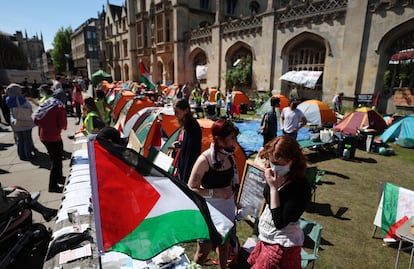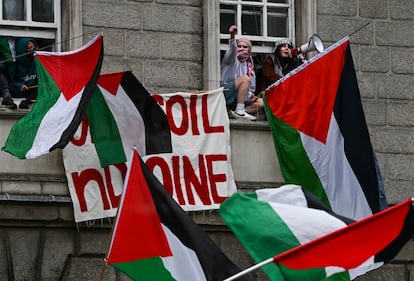Gaza: Universities offer timid concessions to anti-war student protesters
Trinity College Dublin will pull its investments in Israeli companies that are included in the U.N.’s database of businesses of those active in occupied Palestinian territory, a move being considered by prestigious U.S. schools such as Brown


The road has split into two for many of the student protests against the war in Gaza: either they are forcibly repressed or arrive at a final agreement. While New York’s Columbia University, one of the principal staging grounds for the global wave of demonstrations, chose the path of force — vacating the campus after days of police intervention and cancelling graduation ceremonies — other schools have taken the peaceful route towards putting an end to the encampments. Among the pro-Palestine protestors’ primary requirements for ending the mobilizations are divestment from companies with ties to Israel and greater support to the educational sector in occupied lands. Some of the centers where mobilizations have taken place have offered timid concessions to quell them.
One of the latest to arrive at an agreement with its students has been Dublin’s Trinity College. After a five-day encampment, the university issued a statement on Wednesday in which it commits to pulling its investments in Israeli companies that are included in the U.N.’s database of businesses of those active in occupied Palestinian territory. It also says that it will “do more” to make the university more accessible to Gazan students. “We fully understand the driving force behind the encampment on our campus, and we are in solidarity with the students in our horror of what is happening in Gaza,” the school announced.
Local media report that the closure of the campus, located in the heart of the Irish capital, cost the university an estimated $377,000 in lost revenue, largely due to the closure of the exhibition of the Book of Kells, an ancient Celtic manuscript that receives hundreds of thousands of visitors every year. Trinity followed the lead of Brown University, which, like Columbia, forms part of the prestigious Ivy League. Last April 30, Brown announced that it would allow five students to present their arguments in favor of divestment from “companies that facilitate the Israeli occupation of Palestinian Territory.” Although the board will not vote on the proposal until October, this action was enough to reach an agreement with students that put an end to the encampments. In addition, the accord states that no person related to the protests will face sanctions like suspension or expulsion. Similar consensus has been reached by other U.S. universities, such as Northwestern, Minnesota, Rutgers and UC Riverside.

In Spain, the Rector’s Conference (CRUE), which is formed by 77 public and private universities — several have seen the installation of protest camps in recent days — will review “the agreements for collaboration with Israeli universities and research centers that have not expressed a firm commitment to peace and compliance with international human rights.” The spark that was lit in the United States, and that has spread to Europe, has also appeared in different Spanish cities like Madrid, Barcelona, and Valencia. The CRUE says that it endorses “the feelings of the campuses and the demands that are spreading from them and so, in different instances, measures will be adopted to curb the escalation of violence.” The Spanish students, however, have decided that their encampments will continue.
The universities’ dilemma
The students’ primary demand can be summed up by a single word: divest [from Israeli businesses]. At first, the mobilizations requested cuts in contributions to defense companies, but as the encampments have continued, their asks have grown. The overall sentiment was summed up by a student at Oxford University in an interview with Al Jazeera. Their words have gone viral on the social media platform X: “As of right now, students do not have access to where their money is going when they pay tuition fees to this university. So crucially, our first demand is full disclosure of financial investments. We want to know where all the money is going. But then, with this knowledge, we would like to pursue full divestment from two things: first, from all arms manufacturing companies. Whether it’s the current conflict in Gaza, or other armed conflict around the world, our universities should not be investing in that. This is a situation when we should be learning and contributing to a safe community, not to international conflict.”
But in addition to the lack of financial transparency at different universities — Oxford, for example, allows anonymous donations — various academic institutions have rejected the idea of putting an end to cooperation with organizations linked to Israel, out of fear of losing the economic support of important donors of Jewish heritage. Robert Kraft, owner of NFL team the New England Patriots and one of Columbia’s major benefactors, said he didn’t feel “comfortable supporting the university until corrective action is taken.” A few days later, the school’s president allowed police to enter the campus to repress protestors.
On both sides of the Atlantic, many universities have economic ties with companies linked to Israel. For example, Caterpillar and Rolls-Royce, whose vehicles are used by the Israeli military in occupied Palestinian territories, are linked to Columbia and Cambridge, respectively. At Oxford, protestors criticized the institution’s ties to Barclays bank, which they accuse of providing financial services to defense companies that supply equipment to Israel for its offensive campaign in Gaza, which has already caused the death of 35,000 people.
Riot control forces have also been present at schools like Sciences Po in Paris, Free University of Berlin, and University of Amsterdam. The latter has maintained a closure of its facilities since Sunday, after a violent spiral during the preceding days that saw the arrest of some 30 protestors. Amnesty International has called for a review of this police action, saying that “insufficient distinction was made between the peaceful protestors and the group that used violence.”
Translated by Caitlin Donohue.
Sign up for our weekly newsletter to get more English-language news coverage from EL PAÍS USA Edition









































